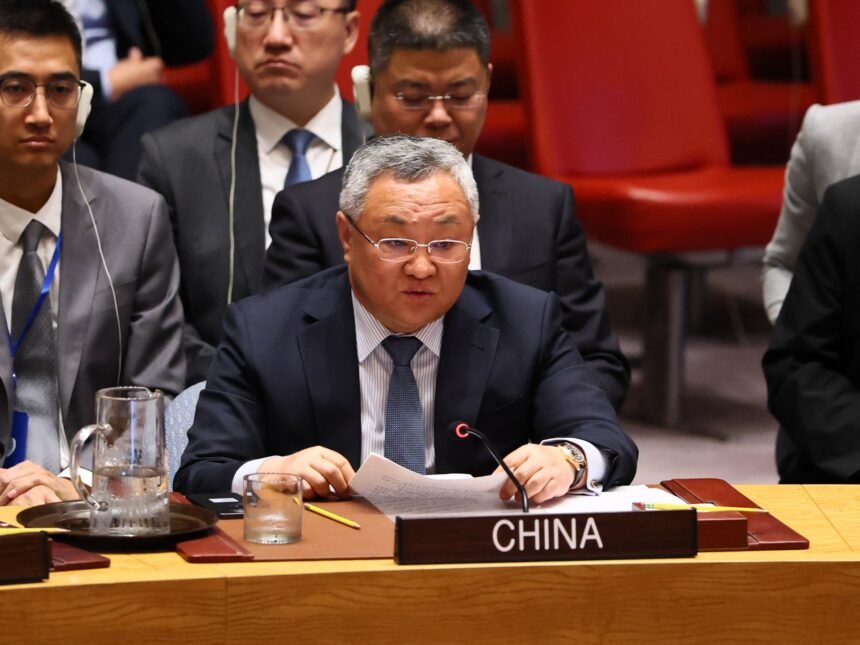By means of the 12 days of the current Israel-Iran battle, China moved shortly to place itself as a possible mediator and voice of cause amid a spiralling regional disaster.
The day after Israel’s unprovoked assault on Iran on June 13, Beijing reached out to either side to specific its need for a mediated resolution even because the nation’s high diplomat, International Minister Wang Yi, condemned Israel’s actions as a violation of worldwide regulation.
Chinese language President Xi Jinping quickly adopted with requires de-escalation, whereas on the United Nations Safety Council, China joined Russia and Pakistan in calling for an “speedy and unconditional ceasefire”.
When Iran threatened to blockade the strategically necessary Strait of Hormuz, by way of which 20 p.c of the world’s oil passes, Beijing was additionally fast to talk out.
The Ministry of International Affairs as a substitute referred to as for the “worldwide group to step up efforts to de-escalate conflicts and stop regional turmoil from having a better influence on world financial growth”.
Beijing’s stance all through the battle remained true to its longstanding noninterference method to overseas hostilities. However consultants say it did little to assist shore up its ambition of turning into an influential participant within the Center East, and as a substitute uncovered the constraints of its clout within the area.

Why China was nervous
In contrast to some international locations, and the US specifically, China historically approaches overseas coverage “by way of a lens of strategic pragmatism reasonably than ideological solidarity”, stated Evangeline Cheng, a analysis affiliate on the Nationwide College of Singapore’s Center East Institute.
This method means China will all the time deal with defending its financial pursuits, of which it has many within the Center East, Cheng informed Al Jazeera.
China has investments in Israel’s burgeoning tech sector and its Belt and Street infrastructure venture spans Iran, Saudi Arabia, Qatar, Oman, Kuwait, Iraq, Egypt and the United Arab Emirates.
Critically, China depends on the Center East for greater than half of its crude oil imports, and it’s the highest client of Iranian oil. A protracted conflict would have disrupted its oil provides, as would an Iranian blockade of the strategically necessary Strait of Hormuz – one thing threatened by Tehran’s parliament through the battle.
“Conflict and safety instability not solely undermines Chinese language funding and commerce and enterprise… but in addition the oil value and fuel power safety basically,” stated Alam Saleh, a senior Lecturer in Iranian Research on the Australian Nationwide College.
“Due to this fact, China seeks stability, and it disagrees and opposes any type of navy resolution for any kind of battle and confrontations, regardless of with whom,” he stated.
John Gong, a professor of economics on the College of Worldwide Enterprise and Economics in Beijing, informed Al Jazeera that China’s high concern by way of the battle was to keep away from “skyrocketing oil costs” that might threaten its power safety.
Flexing diplomatic muscle, defending financial may
Conscious of China’s pleasant relations with Iran and Beijing’s financial fears, US Secretary of State Marco Rubio referred to as on Beijing to maintain Tehran from closing the Strait of Hormuz as ceasefire negotiations stumbled ahead this week.
It was a quick second of acknowledgement of Beijing’s affect, however consultants say China’s general diplomatic affect stays restricted.
“China’s supply to mediate highlights its need to be seen as a accountable world participant, however its precise leverage stays restricted,” Cheng stated. “With out navy capabilities or deep political affect within the area, and with Israel cautious of Beijing’s ties to Iran, China’s position is essentially constrained.”
To make certain, Beijing has demonstrated its skill to dealer main diplomatic offers within the area. In 2023, it mediated the normalisation of relations between Iran and Saudi Arabia. Whereas seen as an enormous diplomatic win for China, consultants say Beijing owed a lot of its success to fellow mediators, Oman and Iraq. China additionally mediated an settlement between Palestinian factions, together with Hamas and Fatah, in July 2024, underneath which they dedicated to working collectively on Gaza’s governance after the tip of Israel’s ongoing conflict on the enclave.
However William Yang, a senior analyst for Northeast Asia on the Brussels-based Worldwide Disaster Group, stated the percentages have been stacked in opposition to China from the start of the most recent battle resulting from Israel’s wariness in direction of its relationship with Iran.
In 2021, China and Iran signed a 25-year “strategic partnership”, and Iran is an energetic participant within the Belt and Street venture. Iran has additionally joined the Beijing-led Shanghai Cooperation Organisation and this yr took half in China’s “Maritime Safety Belt” naval workouts.
Iran’s “resolute opposition to American hegemony” additionally aligns properly with China’s diplomatic pursuits extra broadly, in contrast with Israel’s shut ties to the US, Yang stated.

China’s dilemma
It’s a situation that might be repeated sooner or later, he stated.
“This case additionally reinforces the dilemma that China faces: whereas it desires to be considered as a terrific energy that’s able to mediating in main world conflicts, its shut relationship with particular events in among the ongoing conflicts diminishes Beijing’s skill to play such a job,” Yang stated.
For now, Beijing will proceed to depend on the US as a safety guarantor within the area, he added.
“It’s clear that China will proceed to deal with deepening financial engagement with international locations within the Center East whereas benefiting from the US presence within the area, which stays the first safety guarantor for regional international locations,” Yang stated.
“Alternatively, the US involvement within the battle, together with altering the course of the conflict by bombing Iranian nuclear websites, creates the situation for China to take the ethical excessive floor within the diplomatic sphere and current itself because the extra restrained, calm and accountable main energy,” he stated.
